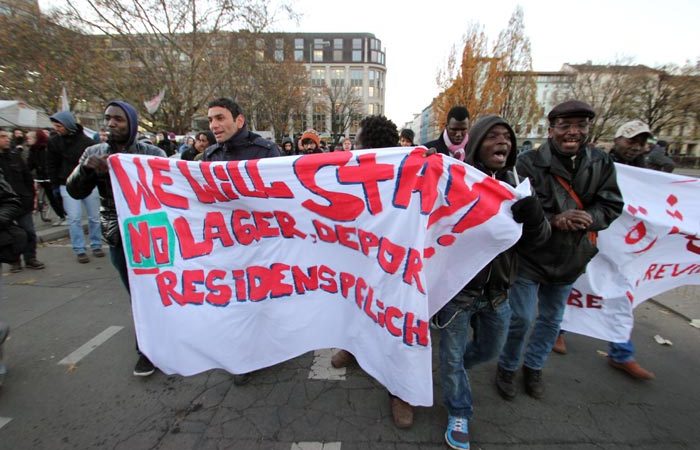Camp at Oranienplatz
21.09.2021 – commemoration of the camp at Oranienplatz: Speech by Bruno
We are standing here at Oranienplatz. This is where the protest march of refugees against the Residenzpflicht ended in 2012. I would like to tell you how this protest march came about.
At the end of January 2012, Mohammad Rahsepar took his own life in the refugee camp in Würzburg. He had already expressed suicidal thoughts in December. Doctors had therefore recommended to the responsible authorities to improve his accommodation situation. He wanted to join his sister in Cologne, but the authorities refused because of the residence obligation. This triggered a wave of protests throughout Germany.
The residence obligation does not exist in any other European country. Its origins go back to colonial times. For example, people in the then German colony of Togo had to stay in one district. Even within the capital Lome, people were not allowed to move freely. My grandmother, who lived in Lome, told me about this.
The National Socialists made compulsory residence a law for forced labourers in their 1938 police regulations. In 1982, the legislators resumed the regulation and enshrined it in the Asylum Procedure Act for asylum seekers.
Until the end of 2014, all asylum seekers had to get permission from the foreigners authority every time they wanted to leave their district. Sometimes they got permission, most of the time they did not.
In the late 90s, the authorities used the residency requirement to prevent asylum seekers from engaging in political activities. At every demo, congress and meeting we had to find a way to deal with controls.
At the end of 2014, the residency requirement was relaxed for some of the asylum seekers. After the first three months in Germany, they are now allowed to move around the whole of Germany without a permit. In theory, at least. Because there are numerous reasons for exclusion from this supposed “freedom of movement”. Above all, refugees with toleration are still at the mercy of the authorities. The foreigners authorities can shackle them to the district at any time.
The asylum system shoves us into pigeonholes: Those entitled to asylum, those recognised under the Geneva Refugee Convention, those with subsidiary protection, tolerated persons and those “obliged to leave the country”… Each pigeonhole is associated with certain rights or restrictions of rights.
This, too, has its roots in colonial times: the idea that human rights do not apply to everyone.
Something else has its roots in colonial times: it is also the German economy that creates causes of flight by exploiting other countries.
For example, Africa, one of the richest continents in the world, has been shackled, plundered and hindered in its development since colonial times.
And Germany, with the EU’s policy, creates causes of flight by cooperating with many dictatorships in the world. The EU cooperates with many torture states in so-called “border protection projects”. The rulers of Europe do not care about human rights violations and torture in these states.
And with German weapons, wars are waged all over the world and the German economy profits from them.
Against this background, we refugees and our families all have a right to freedom of movement and a life in Germany! Because there can be no fair asylum procedures in Germany.
Fair asylum procedures that would be a procedure in which a German authority has to prove that Germany has no share of responsibility for our reasons for fleeing and is not a beneficiary of the situation from which we fled.
Therefore:
No human being is illegal! Right to stay everywhere!
Fredom of movement is everybodys right! We are here and we will fight!
